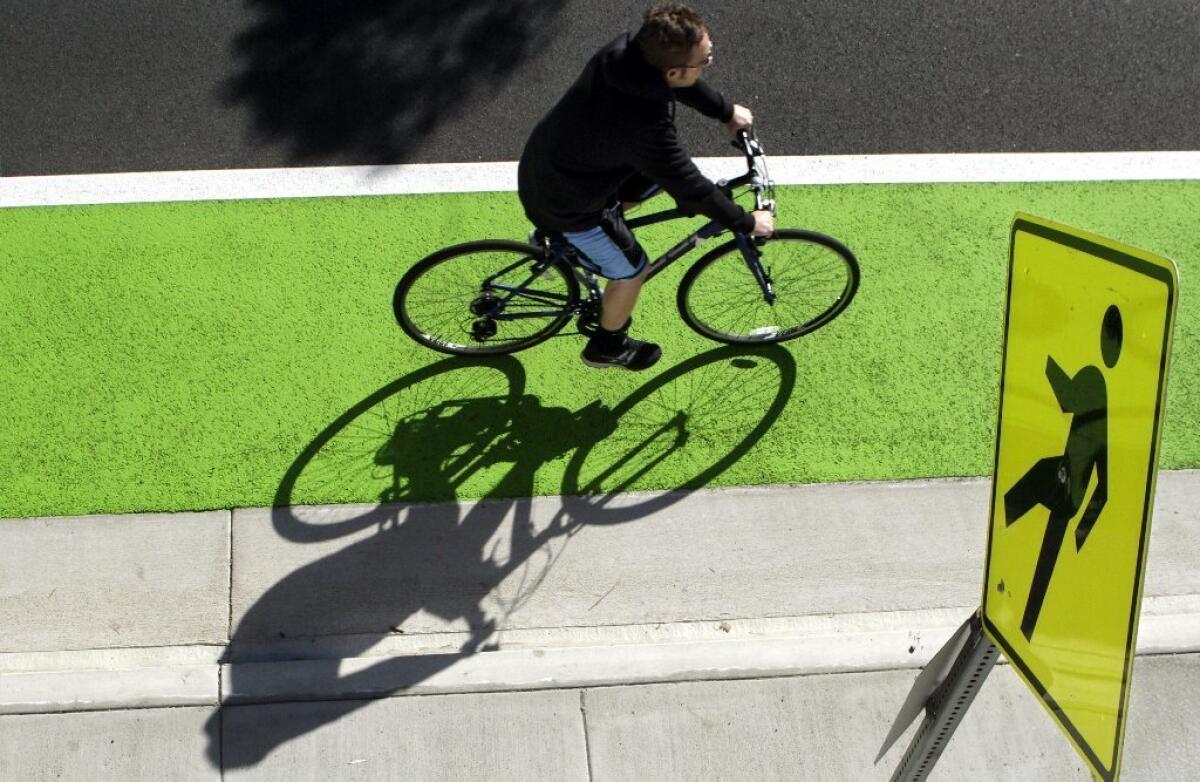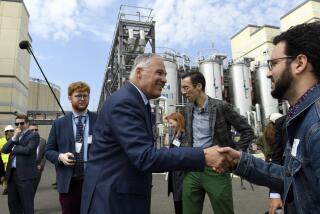A tax on bikes? Hit the road, some cyclists say

- Share via
On the road to a new bicycle tax in Washington state -- more on that in a second -- a legislator, by his own admission, said a rather silly thing to a Tacoma bike shop owner last week.
“If I am not mistaken, a cyclists [sic] has an increased heart rate and respiration,” state Rep. Ed Orcutt wrote in a Feb. 25 email to that owner, Dale Carlson, who shared it with the Los Angeles Times. “That means the act of riding a bike results in greater emissions of carbon dioxide from the rider. Since CO2 is deemed to be a greenhouse gas and a pollutant, bicyclists are actually polluting when they ride.”
The email quickly became very public.
With the subtle hint that a bicyclist’s bodily emissions might be something akin to what comes out of a tailpipe, viral outrage ensued, prompting an apology from Orcutt, the ranking Republican on the state House’s transportation committee, for making “a point [not] worthy of even mentioning.”
Yet like an iceberg, the furor only revealed a small mass of the larger debate that had prompted Orcutt’s comment: Should bikers pay taxes like car drivers do?
“Like eczema, kudzu, and Shia LaBoeuf, the odious notion of imposing a special tax on bicycling keeps popping back up, despite our best efforts to keep it down,” bike blogger Darren Buck wrote this week.
Bicyclists, as a whole, can be a friendly bunch, but one occasionally prone to militancy and evangelism when it comes to protecting their rights to ride: Biking is fun; bike cultures can reshape cities.
So some riders do not fancy the current proposals again circulating in the state legislatures of Washington and neighboring Oregon that they should pay a tax for hitting the road on two wheels instead of four.
Less quoted in Orcutt’s email was his argument for a $25 sales fee for bikes more expensive than $500, which has been wrapped into a $10-billion transportation package proposed by state Democrats in February. The bill includes $60 million for improvements for pedestrians and bicyclists; the bike tax was projected to raise $1 million.
“Currently motorists are paying to use their cars on the roads while they are actually driving their cars,” Orcutt wrote to Carlson. “At the same time, they are paying for bike lanes because there is no gas tax -- or any transportation tax -- generated by the act of riding a bike on the roadways.”
Orcutt concluded, “I do think that bicyclists need to start paying for the roads they ride on rather than make motorists pay.”
Carlson told the Los Angeles Times in a phone interview that the tax on higher-end bikes would hit small-business owners without dinging large retailers like Wal-Mart that sell cheaper models.
“It penalizes people for buying a nice bike, and it puts all the burden on a small segment of the industry, the struggling small-business people – ‘Oh, here we go, here’s another thing we have to comply with and pay our accountants to deal with,’” Carlson said. “It’s kind of the same as a $1,000-dollar [tax] on a $25,000 car.”
A different proposal in Oregon for a one-time $10 bike registration fee -- with a legislator admitting the idea was “symbolic” -- provoked more than 500 reader comments on an Oregonian article raising the idea. “oh god here we go again,” BikePortland.org editor Jonathan Maus tweeted on first hearing the story.
The proposals have stoked a wonk-off with bike advocates who argue that a “symbolic” (or “pointless,” depending your view) tax on bikes might discourage biking instead of driving.
“Bike infrastructure costs public money, especially if it’s done right, but the bike tax wouldn’t even pay for much of it -- with the state’s proposal expected to bring in only a reported $1 million over a decade,” Atlantic Cities’ Eric Jaffe wrote of Washington’s proposal.
Yet Jaffe pointed to Colorado Springs as a successful example of a bike tax. The city’s trails coalition boasts of the $4 bike-sale tax raising $85,000 a year that helps snag matching federal grant money for new bikeway projects.
And Rob Sadowsky, head of the the Portland-based Bicycle Transportation Alliance, has expressed openness to the idea of a sensible bike tax.
Carlson, the Washington bike store owner, said Orcutt had called him a few days later to discuss the bill. Carlson said he wasn’t opposed to a more egalitarian tax that would force bike owners to put a little more skin into public-works projects.
“If there was something that was more fair, it would probably be fine,” Carlson said. “Let’s make it a smaller amount, and let’s put it on all bikes. Let’s get Wal-Mart and Costco involved in it too.”
ALSO:
Late-winter snowstorm threatens Northeast
Suspect in hit and run that killed family returned to Brooklyn
Arkansas Legislature overrides veto to pass restrictive abortion law
More to Read
Sign up for Essential California
The most important California stories and recommendations in your inbox every morning.
You may occasionally receive promotional content from the Los Angeles Times.











